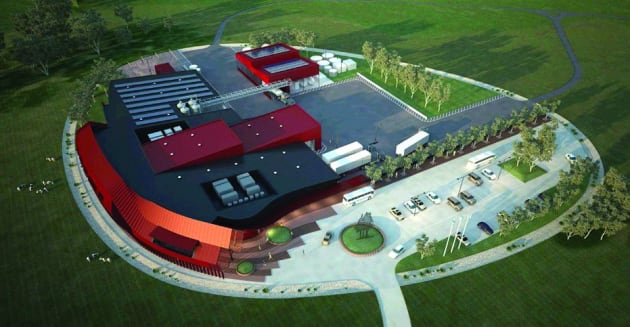The new Bannister Downs dairy farm and facility is being built with the future in mind.
Construction has begun on Bannister Downs Dairy’s fresh, flavoured milk and cream processing facility and tourist destination at Northcliffe, Western Australia.
The $30 million plant is to be called The Creamery, and is being backed by Gina Rinehart’s Hope Dairies, which is a subsidiary of Hancock Prospecting.
The company currently makes premium full-cream, light, flavoured and non-homogenised milk and cream and exports to Singapore.
Bannister Downs also recently moved into ice-cream following the purchase of Azzura Gelati in Perth.
The plant is being built by Bunbury-based Perkins Builders on the farm of Sue and Mat Daubney, the owners of Bannister Downs Dairy.
The process equipment supplier is the Australian arm of German-based GEA Group, and the facility will be fully automated and includes the latest state-of-the-art technology, according to GEA.
‘’GEA has worked closely with Sue and Mat Daubney from the early stages of the project, fine-tuning the process with quality and efficiency the key drivers, GEA Australia’s Gary Wheatley said.
“It’s an exciting project for all involved, especially the local community and the Western Australia dairy industry.’’
The civils, infrastructure and building structures are now underway, with the plant expected to be fully running with first milk due in April 2018.
‘’We have been very grateful for GEA’s patience in assisting us to achieve the best design for our outcomes,” Sue Daubney said.
“It has been a long and involved process over several years and now we look forward to seeing it transition to a completed process plant very shortly.’’
Bunbury-based construction company Perkins Builders began constructing the facility on the greenfields site last year, not far from the existing dairy and production facility.
It will include a GEA low- temperature pasteurisation and processing system and a coolrooms storage and dispatch area.
Bannister Downs uses low temperature pasteurisation in a bid to preserve natural heat-sensitive enzymes and proteins in its milk.
“The low temperature pasteurisation system we use, we believe, may be nutritionally beneficial; enzymes and proteins are all heat sensitive and they can be denatured at higher temperatures,” the company says.
“Our milk has never been over 68 degrees. This also suggests Bannister Downs milk will make the perfect coffee, because it hasn’t been exposed to high temperatures.”
De Laval is supplying the robotic rotary dairy that will include a ‘voluntary’ milking system which will add to the company’s ethical dairy farming practices and is capable of milking more than 500 cows three times a day.
This includes automatic recognition technology to identify each cow as it steps onto the platform, and laser-guided robots to place the milking cups.
The fully automated systems will reportedly support a four-fold increase in production volumes.
A glass-walled, second-floor public viewing gallery is part of the design so visitors can watch the full process.
It will also have an exhibition space, cafe and public sampling area for tourists.







